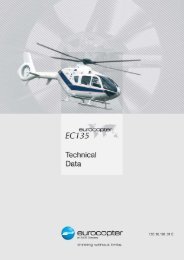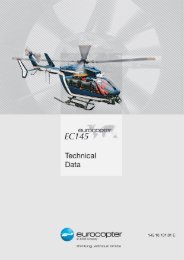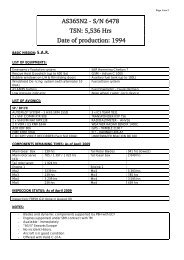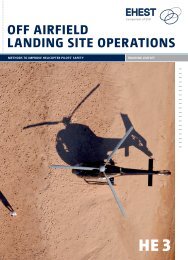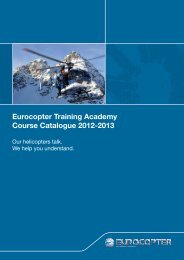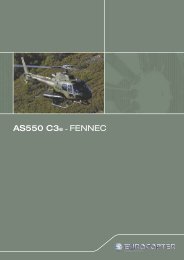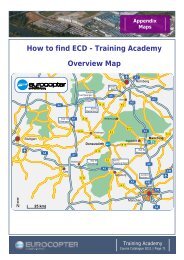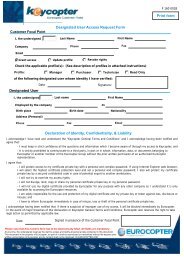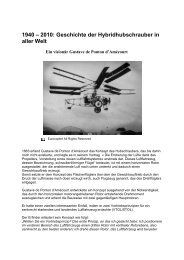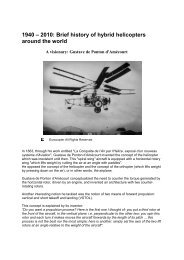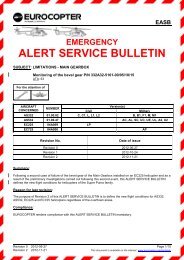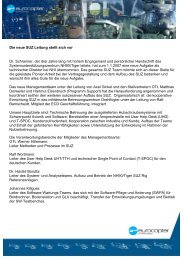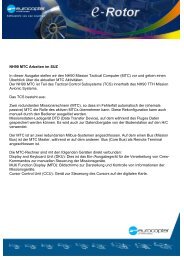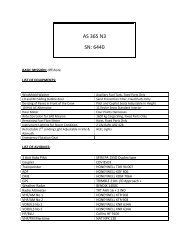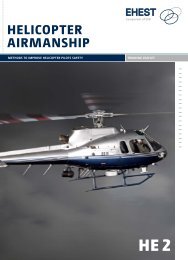Eurocopter Training Academy Course Catalogue 2012-2013
Eurocopter Training Academy Course Catalogue 2012-2013
Eurocopter Training Academy Course Catalogue 2012-2013
You also want an ePaper? Increase the reach of your titles
YUMPU automatically turns print PDFs into web optimized ePapers that Google loves.
<strong>Eurocopter</strong> <strong>Training</strong> <strong>Academy</strong><br />
<strong>Course</strong> <strong>Catalogue</strong> <strong>2012</strong>-<strong>2013</strong><br />
Our helicopters talk.<br />
We help you understand.
General Information<br />
Content<br />
General Information 04<br />
Flight <strong>Training</strong> 12<br />
Simulator <strong>Training</strong> 30<br />
Aircraft Technician <strong>Training</strong> 38<br />
Specialiced <strong>Training</strong> 58<br />
Multimedia Based <strong>Training</strong> 62<br />
Appendix 72<br />
03
General Information<br />
40 years of excellence<br />
Dear Customers,<br />
with over 40 years of experience, the <strong>Training</strong> <strong>Academy</strong> situated at the core of <strong>Eurocopter</strong> plant, provides<br />
the world’s leading helicopter training for pilots and technicians.<br />
Since 2011, we have implemented a completely new blended learning process based on interactive learning<br />
with the latest technology integrating Multimedia Based <strong>Training</strong> (e.g. Computer Aided Instruction on I-Pad)<br />
into theoretical and practical instruction. Our instruction team is composed of experts in their fields with the<br />
utmost operational experience and knowledge.<br />
Although a lot of things have changed in the past 40 years our major goal remains unchanged:<br />
to stand up to your expectations and to contribute decisively to flight safety.<br />
Our course catalogue is designed to cover the full range of your training needs. Nevertheless, we can also<br />
provide your organisation with the most effective training solution tailored to your demand.<br />
The high quality of our training courses is assured by a very strict internal quality system and regularr audits<br />
by national authorities and EASA. The <strong>Eurocopter</strong> <strong>Training</strong> <strong>Academy</strong> is certified to issue certificates<br />
according to EASA PART 147 and JAR FCL 2.<br />
We are extremely proud of our role in providing world class helicopter training.<br />
The <strong>Eurocopter</strong> <strong>Training</strong> <strong>Academy</strong> is looking forward to welcoming you.<br />
Best regards,<br />
04<br />
Team<br />
Charles Hebeka, Senior Accountable Manager <strong>Training</strong> <strong>Academy</strong><br />
<strong>Training</strong> Highlights<br />
„Get complete training from one source – one stop shop <strong>Training</strong> <strong>Academy</strong>“<br />
<strong>Eurocopter</strong> <strong>Training</strong> <strong>Academy</strong><br />
arranges a complete training<br />
program for your flying staff<br />
based on a training need analysis.<br />
New full flight simulator<br />
for EC135.<br />
<strong>Eurocopter</strong> <strong>Training</strong> <strong>Academy</strong><br />
arranges a complete training program<br />
for your staff based on a training need<br />
analysis.<br />
Type training is adapted and<br />
tailored to your demands (additional<br />
training of nearly all available<br />
optional equipment).<br />
Flight<br />
<strong>Training</strong><br />
Aircraft<br />
Technician<br />
<strong>Training</strong><br />
<strong>Training</strong> <strong>Academy</strong> flight instructors<br />
have thousands of hours of real-life<br />
experience on <strong>Eurocopter</strong> helicopters<br />
as well as a high common level<br />
based on regular standardization.<br />
Flight <strong>Training</strong> <strong>Course</strong>s are<br />
tailored to customers’ needs –<br />
complete training for usage of all<br />
standard and optional equipment.<br />
Practical <strong>Training</strong> for all helicopters<br />
(BO105, BK117, EC145 and EC135)<br />
on fully equipped maintenance<br />
trainers similar to series helicopter.<br />
equipment<br />
<strong>Eurocopter</strong> <strong>Training</strong> <strong>Academy</strong> is one<br />
of the most modern training centres<br />
in the world. Nevertheless any<br />
training course can be carried out<br />
at your facility.<br />
05
General Information<br />
Contact<br />
For additional information, course enrolment or special course arrangements please contact us:<br />
Christian FINKBEINER Sylvine GRUENE Armin ROSER<br />
Manager Technical <strong>Training</strong> Manager Simulator <strong>Training</strong> Manager Flight <strong>Training</strong><br />
MTO FTO FTO<br />
Phone: +49 906 71-1573 Phone: +49 906 71-5522 Phone: +49 906 71-4639<br />
christian.finkbeiner@eurocopter.com sylvine.gruene@eurocopter.com armin.roser@eurocopter.com<br />
Barbara ROBERT Peter BOHLENDER Yvonne OTTO-LANDGRAF<br />
Assistant <strong>Training</strong> <strong>Academy</strong> Technical Management Simulator Assistant <strong>Training</strong> <strong>Academy</strong><br />
Planning & Enrolment Technical FTO Planning & Enrolment Flight <strong>Training</strong><br />
<strong>Training</strong> MTO FTO<br />
Phone: +49 906 71-4481 Phone: +49 906 71-3820 Phone: +49 906 71-4646<br />
barbara.robert@eurocopter.com peter.bohlender@eurocopter.com yvonne.otto-landgraf@eurocopter.com<br />
MTO = Maintenance <strong>Training</strong> Organisation<br />
FTO = Flight <strong>Training</strong> Organisation<br />
06<br />
<strong>Eurocopter</strong> <strong>Training</strong> <strong>Academy</strong><br />
Flight <strong>Training</strong> Organisation (FTO)<br />
The FTO is approved in accordance with JAR-FCL 2.<br />
Our pilots are highly experienced flight instructors with thousands<br />
of flight hours under real-life conditions worldwide. They are<br />
significantly involved in the test flight operations knowing all<br />
details and possess background information about our systems<br />
produced on site. Besides, they keep a close relationship with<br />
EUROCOPTER’s design department and maintenance staff in<br />
order to offer accurate training including latest innovations.<br />
Simulations, Computer Based <strong>Training</strong> (CBT), avionics trainers (AVT)<br />
and a Full Flight Simulator (FFS) are also available.<br />
Our EC135 Full Flight Simulator (FSS Level B) is a full motion<br />
simulator approved by LBA and accepted by most other aviation<br />
authorities.<br />
Maintenance <strong>Training</strong> Organisation (MTO)<br />
The MTO is approved in accordance with EASA PART 147.<br />
Our technical instructors are experts in their fields with an attested<br />
long time experience. They work closely with the engineering<br />
departments and make each student’s success a priority.<br />
For the theoretical training the classrooms are equipped with the<br />
latest electronic media. Students have access to all aircraft parts<br />
and documents. Simulations and multimedia based training (MBT)<br />
complete the diversified theoretical instruction leaving no question<br />
unanswered.<br />
For every single practical training we offer fully equipped helicopter<br />
mock-ups representing series helicopters. All necessary special<br />
tools (incl. test equipment) are available and can be demonstrated.<br />
The practical training is not only following the regulatory requirements<br />
but also considering latest technical developments and<br />
fleet analyses to support continuously safe operations.<br />
07
General Information<br />
Before your Stay<br />
Registration<br />
Registration for all courses shall be achieved 2 months prior to the beginning of the course.<br />
Please send us the following information:<br />
08<br />
Flight <strong>Training</strong><br />
Simulator <strong>Training</strong><br />
Aircraft Technician <strong>Training</strong><br />
Specialized <strong>Training</strong><br />
Multimedia Based <strong>Training</strong><br />
• Registration Form*<br />
• Pilots Questionnaire*<br />
• Copy of passport<br />
• Copy of pilot licence<br />
• Copy of valid medical<br />
• Registration Form*<br />
• Pilots Questionnaire*<br />
• Copy of passport<br />
• Copy of pilot licence<br />
• Copy of valid medical<br />
• Registration Form*<br />
• Pilots Questionnaire*<br />
• Copy of passport<br />
• Registration Form*<br />
• Copy of passport<br />
• Registration Form*<br />
• Copy of passport<br />
* All registration forms are available online (www.eurocopter.com/trainingacademy) for download and print.<br />
Travel<br />
Please make sure you have: For practical training:<br />
• a valid passport Appropriate working clothes are needed (safety shoes<br />
• an up-to-date passport size picture are available on site upon request).<br />
• Visa (if necessary)<br />
• an international health insurance<br />
Transport and Accommodation<br />
The <strong>Training</strong> <strong>Academy</strong> is located in a 10 minutes walking distance from Donauwörth city centre with several<br />
hotels and a railway station. We are pleased to help you arranging transport and accommodation. A list of<br />
hotels with ECD special prices is also available upon request. Participants’ expenses for travel and<br />
accommodation are not included in the course fees.<br />
Car rental „Sixt“ is situated within a 15 min walking distance from EUROCOPTER.<br />
Taxi<br />
If you need a taxi for private use, please ask the receptionist in your hotel. During normal working hours our<br />
<strong>Training</strong> Assistants will be pleased to make arrangements.<br />
Usual taxi charges:<br />
From Donauwörth to Augsburg centre approx. 75 €<br />
From Donauwörth to Munich Airport approx. 150 €<br />
Postal Address Payment<br />
During your stay at the <strong>Training</strong> <strong>Academy</strong><br />
your postal address will be:<br />
Payment has to be made to our account in EURO.<br />
HypoVereinsbank AG, München<br />
Your Name Account No.: 2702100<br />
EUROCOPTER DEUTSCHLAND GmbH Bank Code: 70020270<br />
EBSTO - <strong>Training</strong> <strong>Academy</strong> IBAN DE 91 70020270 000 2702100<br />
D-86607 Donauwörth S.W.I.F.T HYVE DE MM<br />
Cancellation<br />
In case the course has to be postponed or cancelled due to the insufficient number of participants, we will<br />
inform you immediately and we will make our best to find an appropriate solution.<br />
09
General Information<br />
During Your Stay<br />
First Day<br />
Please present yourself at 07:45 at main entrance with your passport. After completing the formalities at the<br />
reception (check-in and badge), you will be accompanied to our facilities.<br />
Information Board<br />
For telephone calls, bus schedule, canteen / lunch menu etc. all information will be available in each of our<br />
lounges.<br />
Daily Lessons<br />
Monday - Friday:<br />
Start: 08:15 am<br />
End: 16:00 / 4:00 pm (including Friday)<br />
During the breaks, you can relax in our lounges.<br />
Lunch/Dinner<br />
Lunch is included and served at the ECD restaurant on training days<br />
Telephone Calls<br />
For business calls a telephone is available at the reception. Please contact our <strong>Training</strong> Assistants, they will<br />
provide you connection.<br />
Internet Access<br />
Internet access as well as WLAN is provided in every lounge.<br />
Medical Care<br />
Emergencies: dial 112<br />
Medical centre: from 07:00 to 17:00 (Monday - Friday), Extension: 74329.<br />
Urgent medical care: ask your receptionist for assistance.<br />
Emergency Hospital „Kreiskrankenhaus Donauwörth“, Phone: 0906 7820.<br />
Please make sure that you have an international health insurance valid for Germany.<br />
10<br />
Police<br />
• Police Station Donauwörth Phone: 0906 706670<br />
• Police Station general in Germany Phone: 110 (only in case of emergency)<br />
Security Rules in the Factory<br />
As per <strong>Eurocopter</strong> Deutschland’s policy in terms of security regulations, you are kindly requested to observe<br />
the following:<br />
• Badges must be carried and visible at all times.<br />
• Cameras are not allowed within the premises at any time.<br />
• Please declare PC, notebook, mobile-phone with camera at the main entrance.<br />
• Access is only allowed to facilities directly related to the training courses.<br />
• Participants must at all times be accompanied by a <strong>Eurocopter</strong> staff for any access to other facilities.<br />
Note:<br />
In case of any issue or require assistance, please feel free to contact any member of the school staff.<br />
We will do everything possible to assist you and make your stay at the <strong>Training</strong> <strong>Academy</strong> the most<br />
enjoyable and successful.<br />
11
Flight <strong>Training</strong><br />
12<br />
Flight <strong>Training</strong><br />
On the following pages you find the Flight <strong>Training</strong> course descriptions.<br />
All courses are available on request.<br />
<strong>Course</strong> language is English. But fundamentally for all courses a real-time translation provided by an<br />
experienced team of interpreters can be offered, please don’t hesitate to ask for details. All students who<br />
have not employed an interpreter have to pass an initial English test at the beginning of the training course.<br />
This is to prove that they have a basic understanding of English to follow the course. In case a student fails<br />
this test <strong>Eurocopter</strong> <strong>Training</strong> <strong>Academy</strong> will organise an interpreter who will be charged to the customer.<br />
Note: JAR FCL 2 requires examination and assessment in the language of the pilot documentation!<br />
<strong>Course</strong> Description<br />
• Type Rating VFR, TR VFR page 14<br />
• Type Rating IFR, TR IFR page 15<br />
• Ground Run and Maintenance Check Flight, MCF page 16<br />
• Emergency Refresher, ERH page 17<br />
• Type Rating Instructor Initial, TRII page 18<br />
• Type Rating Instructor Extension, TRIE page 19<br />
• Instrument Rating Instructor, IRI page 20<br />
• Instrument Rating Helicopter, IRH page 21<br />
• Instrument Rating Transition from Airplane to Helicopter, IRT page 22<br />
• OPS 3 Performance Class 1, CAT A page 23<br />
• Specific <strong>Training</strong>s, External Hoist Procedures EHP, External Load Procedures ELP page 24<br />
• Specific <strong>Training</strong>s, Night Flight Procedures NFP, Types Differences DIF page 25<br />
• GPS Stand Alone Approaches, GPS page 26<br />
• Night Vision Google, NVG page 27<br />
• Forward Looking Infra Red Operator <strong>Training</strong>, FLIR page 28<br />
• IFR Refresher, IR page 29<br />
13
Flight <strong>Training</strong><br />
Helicopter Type<br />
14<br />
Duration<br />
Prerequisites<br />
Description<br />
Note<br />
Type Rating VFR, TR VFR<br />
According to FCL-2 FTO approval<br />
BO105, BK117, EC145, EC135<br />
BO105, BK117: Theory 5 days<br />
EC145, EC135: Theory 8 days<br />
Flight <strong>Training</strong>: minimum 8 flight hours + 1 flight hour skill test<br />
Pilots to be trained must be graduated helicopter pilots holding a valid helicopter pilot<br />
licence with a minimum of 70 FH as PIC.<br />
This course provides helicopter pilots with knowledge and skills on the relevant<br />
helicopter. It enables and certifies them to fly the related type of H/C safely and<br />
efficiently in accordance with JAR FCL-2 regulations.<br />
• 5 days theory ground course for the basic helicopter including a written examination<br />
• 3 days theory course for FCDS, AFCS and NMS equipment General introduction<br />
of the helicopter type (cockpit, cabin, daily inspection, refueling, handling, covers<br />
and tie downs)<br />
• Normal procedures<br />
• Emergency procedures<br />
• Flight with MTOW<br />
• Slope landings<br />
• Use of optional equipment: FCDS, AFCS, NMS (if required)<br />
• Skill test<br />
The required minimum flight time for Type Rating <strong>Training</strong> is based on the experience<br />
of the pilots to be trained.For any further questions feel free to contact us at<br />
any time.<br />
Flight <strong>Training</strong><br />
Helicopter Type<br />
Duration<br />
Prerequisites<br />
Description<br />
Note<br />
Type Rating IFR, TR IFR<br />
According to FCL-2 FTO approval<br />
BO105, BK117, EC145, EC135<br />
Theory: 1 day<br />
Flight <strong>Training</strong>: minimum 5 flight hours + 1 hour skill test<br />
Pilots to be trained must have a valid instrument rating on helicopter (IR (H)), a valid<br />
type rating and experience on the relevant helicopter type. Pilots holding a JAR FCL<br />
license must be able to perform the radio communication in English language.<br />
This course provides Instrument Rated helicopter pilots with knowledge and skills,<br />
enabling and certifying them to fly the relevant helicopter type under Instrument<br />
Flight Rules (IFR) in accordance JAR FCL-2 regulations.<br />
• Theory instruction: FLM IFR-supplement, flight planning, checklists<br />
• IFR-basic procedures<br />
• IFR departure and approach procedures<br />
• IFR emergency procedures<br />
• Skill test<br />
The amount of theoretical instruction as well as the amount of flight hours depends<br />
on the experience and knowledge of the pilot to be trained.<br />
15
Flight <strong>Training</strong><br />
Helicopter Type<br />
16<br />
Duration<br />
Prerequisites<br />
Description<br />
Note<br />
Ground Run and Maintenance Check Flight, MCF<br />
BO105, BK117, EC145, EC135<br />
Theory: 1 day<br />
Flight <strong>Training</strong>: 2 flight hours<br />
Pilots to be trained must have a valid rating for the relevant helicopter type. Pilots<br />
should also have sufficient flight experience on the relevant type of helicopter. We<br />
recommend a minimum of 50 flight hours.<br />
This course provides experienced helicopter pilots with knowledge and skills to<br />
carry out ground run & maintenance check flights on the related type of helicopter.<br />
• Theory introduction of MSM, AMM and other necessary documents.<br />
MCF-forms and check lists.<br />
• Depending of the optional equipment (SAS, AFCS) one or two flights with the<br />
related MCF-program<br />
The instruction does not include tracking and dynamic balancing.<br />
Flight <strong>Training</strong><br />
Helicopter Type<br />
Duration<br />
Prerequisites<br />
Description<br />
Note<br />
Emergency Refresher, ERH<br />
BO105, BK117, EC145, EC135<br />
Theory: 2 days<br />
Flight <strong>Training</strong>: 3 flight hours<br />
Pilots to be trained must hold a valid helicopter pilot licence and hold or have<br />
held a valid relevant helicopter type rating (for type rating renewal, please check<br />
requirements with your civil aviation authority before commencing the course).<br />
This course will renew pilots system knowledge and skills with<br />
normal and emergency flight procedures on the relevant type of helicopter.<br />
• Repetition of system knowledge with the training manual<br />
• Repetition of theoretical knowledge with the FLM<br />
• Basic and normal flight procedures<br />
• Emergency and malfunction procedures<br />
The amount of flight hours and the duration of the theoretical instruction are<br />
variable. They depend on the flight experience of the pilot to be trained or<br />
specific demands.<br />
17
Flight <strong>Training</strong><br />
Helicopter Type<br />
18<br />
Duration<br />
Prerequisites<br />
Description<br />
Note<br />
Type Rating Instructor (Initial), TRII<br />
According to FCL-2 FTO approval<br />
BO105, BK117, EC145, EC135<br />
VFR: Theory 2 days +3 days Pedagogics; Flight <strong>Training</strong>: 6 flight hours<br />
IFR: Theory 1 day; Flight <strong>Training</strong>: included within VFR part<br />
The applicant has a total flight time on helicopters of not less than 500 hours PIC.<br />
He holds a current type rating on the respective training helicopter with a minimum<br />
of 15 flight hours as Pilot In Command. He also needs adequate experience on the<br />
training helicopter variant.<br />
This course provides experienced helicopter pilots with knowledge and skills to give<br />
type rating training on the relevant helicopter type. It enables and certifies them<br />
to act as an instructor pilot on the related type of helicopter based on JAR FCL-2<br />
regulations.<br />
• Pedagogical basics – course for teaching and learning Repetition of all helicopter<br />
systems, limitations, procedures with training and flight manual<br />
• Preparation of lessons – preparation of flights<br />
• 4 flight hours on the left hand seat with all common normal and emergency<br />
procedures VFR and IFR if required<br />
• 2 flight hours with simulated lessons (ECD instructor acts as student pilot)<br />
• 1 flight hour: TRI assessment<br />
The training and total number of flight hours depend on complexity of the helicopter<br />
version. They may increase based on the flight instructor’s judgement. The primary<br />
consideration is the safe conduction of training.<br />
Flight <strong>Training</strong><br />
Helicopter Type<br />
Duration<br />
Prerequisites<br />
Description<br />
Note<br />
Type Rating Instructor (Type Extension), TRIE<br />
According to FCL-2 FTO approval<br />
BO105, BK117, EC145, EC135<br />
VFR: Theory 2 days; Flight <strong>Training</strong>: 5 flight hours<br />
IFR: Theory 1 day; Flight <strong>Training</strong>: included within VFR part<br />
+ TRI assessment check: 1 hour<br />
The applicant has a total flight time on helicopters of not less than 500 hours PIC.<br />
He holds a current type rating on the respective training helicopter with a minimum<br />
of 15 flight hours as Pilot In Command. He also needs adequate experience on the<br />
training helicopter variant.<br />
This course provides experienced helicopter pilots with knowledge and skills to give<br />
type rating training on the relevant helicopter type. It enables and certifies them<br />
to act as an instructor pilot on the related type of helicopter based on JAR FCL-2<br />
regulations.<br />
• Repetition of all helicopter systems, limitations, procedures with training and<br />
flight manual<br />
• Preparation of lessons – preparation of flights<br />
• 3 flight hours on the left hand seat with all common normal and emergency<br />
procedures VFR and IFR if required<br />
• 2 flight hours with simulated lessons (ECD instructor acts as student pilot)<br />
• 1 flight hour: TRI assessment<br />
The training and total number of flight hours depend on complexity of the helicopter<br />
version. They may increase based on the flight instructor’s judgement. The primary<br />
consideration is the safe conduction of training.<br />
19
Flight <strong>Training</strong><br />
Helicopter Type<br />
20<br />
Duration<br />
Prerequisites<br />
Description<br />
Note<br />
Instrument Rating Instructor IRI<br />
BO105, BK117, EC145, EC135<br />
2 days Theoretical instruction and minimum 10 hours on Helicopter or Simulator (for<br />
EC135 only).<br />
Pilots to be trained must reach all general requirements for instructors according<br />
JAR-FCL 2.310. The applicant is a qualified type rating instructor TRI (or FI) on the<br />
relevant helicopter and holds a valid IR (H) for that type. He needs as well adequate<br />
experience on the training helicopter variant. He needs an experience of more than<br />
500 flight hours under IFR of which min. 250 flight hours have been flown in<br />
helicopters.<br />
This course provides the applicant with knowledge and skills, enabling and<br />
certifying him to instruct non IR rated pilots to achieve their initial instrument rating.<br />
The training consist of:<br />
• Theory instruction: FLM IFR-supplement, flight planning, checklists<br />
• IFR-basic procedures<br />
• IFR departure and approach procedures<br />
• IFR emergency procedures<br />
• Skill test<br />
The amount of theoretical instruction as well as the amount of flight hours depends<br />
on the experience and knowledge of the pilot to be trained. The amount of hours<br />
for theoretical instruction, flight hours on helicopter represents a minimum required<br />
by JAR FCL2. For foreign course participants these minima can be altered to their<br />
specific regulations.<br />
Flight <strong>Training</strong><br />
Helicopter Type<br />
Duration<br />
Prerequisites<br />
Description<br />
Note<br />
Instrument Rating Helicopter, IRH<br />
According to JAR FCL-2<br />
BO105, BK117, EC145, EC135<br />
3 to 4 months including 150 hours theory + 55 flight hours. Practical training for<br />
EC135 possible: 40 flight hours in simulator and 15 flight hours on helicopter.<br />
Pilots to be trained must hold a valid helicopter pilot licence including night flight<br />
qualification and a valid type rating for the relevant helicopter type. The participant<br />
must have a flight experience of at least 50 flight hours in cross-country flights as<br />
PIC (on helicopters or aeroplanes), of which a minimum of 10 flight hours have to<br />
be on helicopters. The participant must be proficient in English to show his ability to<br />
understand and communicate for all courses related matters in this anguage. FCL-2<br />
licensed pilots must hold an English language proficiency level 4 as minimum.<br />
• Theory course with minimum 150 hours lessons in all subjects regarding IFR<br />
• Written examination for theory<br />
• Flight preparation, calculation and planning<br />
• Basic instrument flight procedures<br />
• Instrument flight procedures (i.e. interceptions, holdings)<br />
• Instrument departure and approach procedures<br />
• Instrument cross country flights / emergency procedures<br />
• Skill test<br />
The training duration shall be adapted to the customer skills as well as the specific<br />
regulations.<br />
21
Flight <strong>Training</strong><br />
Helicopter Type<br />
22<br />
Duration<br />
Prerequisites<br />
Description<br />
Note<br />
Instrument Rating<br />
Transition from Airplane to Helicopter, IRT<br />
According to FCL-2<br />
BO105, BK117, EC145, EC135<br />
Theory: minimum 3 days<br />
Flight training: 15 flight hours on helicopter or 10 hours on Simulator (for EC135<br />
only) and 5 hours on helicopter + 1.5 flight hour skill test.<br />
Pilots to be trained must have a valid IR (A) and a valid rating for the relevant helicopter<br />
type/variant.<br />
This course provides helicopter pilots holding an IR (A), with knowledge and skills,<br />
enabling and certifying them to fly helicopters under Instrument Flight Rules (IFR) in<br />
accordance JAR FCL-2 regulations.<br />
The amount of hours for theoretical instruction, flight hours on helicopter represents<br />
a minimum required by JAR FCL2. For foreign course participants these minima can<br />
be altered to their specific regulations.<br />
Flight <strong>Training</strong><br />
Helicopter Type<br />
Duration<br />
Prerequisites<br />
Description<br />
Note<br />
OPS 3 Performance Class 1, CAT A<br />
BO105, BK117, EC145, EC135<br />
Theory: 1 day<br />
Flight <strong>Training</strong>: 2 flight hours<br />
Pilot to be trained must have a valid rating for the relevant helicopter type.<br />
Flight experience on the relevant helicopter should be at least 10 flight hours.<br />
This training can also be implemented in a standard type rating course.<br />
This course is designed to understand and professionally use the procedures<br />
described in the Flight Manual Supplement CAT. A, and to renew pilots knowledge<br />
and skills of the associated emergency procedures on the related type of helicopter.<br />
• Introduction of performance classes<br />
• Different variants of PC 1 procedures<br />
• All necessary calculations for PC 1 performance – in regard to the applied<br />
procedure – with datas from the respective FLM supplement<br />
• Flight preparation according FLM supplement<br />
• Practical flight training with every variant of PC 1 normal and OEI procedures<br />
The amount of flight hours is variable and depends on the<br />
experience of the pilot to be trained.<br />
23
Flight <strong>Training</strong><br />
Helicopter Type<br />
24<br />
Duration<br />
Prerequisites<br />
Description<br />
Note<br />
Specific <strong>Training</strong>s<br />
External Hoist Procedures EHP, External Load Procedures ELP<br />
BO105, BK117, EC145, EC135<br />
External Hoist (type extension): Theory 1 day, Flight training min. 2 hours<br />
External Load: Theory 2 to 3 hours, Flight training min. 1 hour<br />
Pilots to be trained must have a valid rating for the relevant helicopter type/variant.<br />
The training course provides theoretical knowledge and practical skills and enables<br />
pilots and operators to operate the related type of equipment by day in accordance<br />
with official technical and operational documentation.<br />
Flight training flown together with winch procedures qualified operator. They should<br />
bring appropriate working clothes (incl. shoes, helmet and gloves) with them. Hoist<br />
operation in mountainous area and/or over water only if allowed by local aviation<br />
authority and on special request. For initial hoist operator qualification detailed<br />
syllabi on request.<br />
Flight <strong>Training</strong><br />
Helicopter Type<br />
Duration<br />
Prerequisites<br />
Description<br />
Note<br />
Specific <strong>Training</strong>s<br />
Basic Night Flight Procedures NFP,<br />
Helicopter Differences <strong>Training</strong> DIF<br />
BO105, BK117, EC145, EC135<br />
NFP: Theory 1 to 2 hours, Flight training min. 1 hour (only traffic pattern),<br />
from October to March<br />
DIF: Theory: 1 to 4 days*, Flight training 1 to 4 hours*,<br />
*epending on differences<br />
Pilots to be trained must have a valid rating for the relevant helicopter type.<br />
The training course provides theoretical knowledge and practical skills and enables<br />
pilots to operate by night or to operate the related variant of helicopter.<br />
Detailed syllabi are available on request.<br />
25
Flight <strong>Training</strong><br />
Helicopter Type<br />
26<br />
Duration<br />
Prerequisites<br />
Description<br />
Note<br />
GPS Stand Alone Approaches, GPS<br />
CMA 3000 / 9000, Garmin 430 / 530 series,<br />
Trimble/Free Flight 2000 series.<br />
Theory: 1 day<br />
Flight training: 2 to 3 hours<br />
Pilots to be trained must have a valid IR (H) and a valid rating for the relevant<br />
helicopter type/variant.<br />
This course provides IR (H) licensed helicopter pilots with knowledge and skills,<br />
enabling them to use the GPS in a professional way and to enable them to conduct<br />
GPS stand alone approaches.<br />
LBA training minimum: 2 approaches plus 1 complete missed approach at an airfield<br />
with a certified GPS approach procedure. For foreign course participants these<br />
minima can be altered to their specific regulations.<br />
Flight <strong>Training</strong><br />
Helicopter Type<br />
Duration<br />
Prerequisites<br />
Description<br />
Note<br />
Night Vision Goggle, NVG<br />
BO105, BK117, EC145, EC135, if NVG compatible.<br />
Theory: 1 week<br />
Flight training: 15 flight hours by night (11 flight hours of 15 can be performed in the<br />
Simulator if trainee is EC135 rated)<br />
Pilots to be trained must have a valid rating for the relevant helicopter type/variant.<br />
He must have night flight experience. It is advisable to have an IR (H) rating or to<br />
have received an inadvertent IMC situation recovery training.<br />
The training course provides theoretical knowledge and practical skills and enables<br />
pilots to operate by night with NVG, as well as Crew coordination in tactical<br />
missions additional using FLIR.<br />
For any further questions, feel free to contact us at any time.<br />
27
General Information<br />
Flight <strong>Training</strong> Flight <strong>Training</strong><br />
Helicopter Type<br />
28<br />
Duration<br />
Prerequisites<br />
Description<br />
Note<br />
Forward Looking Infrared Operator <strong>Training</strong><br />
Basic training, FLIR<br />
BO105, BK117, EC145, EC135<br />
Total 5 days, including theory + 2 flight hours by day + 1 flight hour by night per<br />
operator<br />
Helicopter and ground power unit must be available during theory. A pilot holding<br />
a valid rating for the relevant helicopter type/variant and having current night flight<br />
experience, should be provided by the customer for flight training.<br />
Basic training of a crew on the FLIR system. The training course will be terminated<br />
by a written examination in theoretical and practical knowledge.<br />
<strong>Course</strong> duration is for 1 – 2 operators for any additional operator to be trained,<br />
course duration will be increased.<br />
Helicopter Type<br />
Duration<br />
Prerequisites<br />
Description<br />
Note<br />
IFR Refresher, IR<br />
BO105, BK117, EC145, EC135<br />
Theory: 1 day<br />
Flight training: 3 flight hours per pilot<br />
Pilots to be trained must hold or have held a type rating on the relevant helicopter.<br />
On completion of this course, the applicant is theoretically and practically<br />
standardized / refreshed for normal and emergency instrument flight procedures.<br />
• Refreshment of IFR procedures in regard of the FLM supplement for instrument<br />
flight<br />
• Various departure and arrival procedures under difficult weather conditions<br />
including missed approach procedures and continued flight to an alternate airport<br />
• Emergency procedures<br />
For any further questions, feel free to contact us at any time.<br />
29
Simulator<br />
<strong>Training</strong><br />
30<br />
Simulator <strong>Training</strong><br />
Our EC135 P2+ Full Flight Simulator (FSS Level B) is a full motion simulator approved by LBA and<br />
accepted by most other aviation authorities.<br />
On the following pages you find the Simulator <strong>Training</strong> course descriptions.<br />
All courses are available on request.<br />
<strong>Course</strong> language is English. But fundamentally for all courses a real-time translation provided by an<br />
experienced team of interpreters can be offered, please don’t hesitate to ask for details. All students who<br />
have not employed an interpreter have to pass an initial English test at the beginning of the training course.<br />
This is to prove that they have a basic understanding of English to follow the course. In case a student fails<br />
this test <strong>Eurocopter</strong> <strong>Training</strong> <strong>Academy</strong> will organise an interpreter who will be charged to the customer.<br />
Note:<br />
JAR FCL 2 requires examination and assessment in the language of the pilot documentation!<br />
<strong>Course</strong> Description<br />
• Emergency Refresher, ERS page 32<br />
• IFR Refresher, IRS page 33<br />
• Simulator - Instructor Operation Station course IOS page 34<br />
• Type Rating IFR, TR IFR page 35<br />
• Ground Run and Maintenance Check Flight, MCF page 36<br />
• OPS 3 Performance Class 1, CAT A page 37<br />
31
Simulator <strong>Training</strong><br />
Helicopter Type<br />
32<br />
Duration<br />
Prerequisites<br />
Description<br />
Note<br />
Emergency Refresher, ERS<br />
EC135<br />
Theory: 2 days<br />
Flight training: 4 SIM slots of 1 hour per Pilot<br />
Pilots to be trained must hold or have held a valid EC135 type rating.<br />
On completion of this course, the applicant is theoretically and practically<br />
standardized / refreshed for helicopter system knowledge as well as for normaland<br />
emergency flight procedures on the EC135.<br />
• Repetition of system knowledge – <strong>Training</strong> Manual<br />
• Repetition of FLM chapters with focus on limitations, performance, normal and<br />
emergency procedures<br />
• Familiarization with the Simulator/FNPT and the training area<br />
• Repetition of all common normal procedures under different meteorological day<br />
or night conditions and various mission profiles<br />
• Repetition of malfunction and emergency procedures including major<br />
emergencies like engine fire, smoke in cockpit, various tail rotor problems and<br />
FADEC failures<br />
For any further questions, feel free to contact us at any time.<br />
Simulator <strong>Training</strong><br />
Helicopter Type<br />
Duration<br />
Prerequisites<br />
Description<br />
Note<br />
IFR Refresher, IRS<br />
EC135, EC145<br />
Theory: 1 day<br />
Flight training: 4.5 (3 x 1.5h) h SIM slots per pilot<br />
Pilots to be trained must hold a valid type rating EC135 or EC145 IR.<br />
On completion of this course, the applicant is theoretically and practically<br />
standardized / refreshed for normal and emergency instrument flight procedures on<br />
the EC135 or EC145.<br />
• Refreshment of IFR procedures in regard of the FLM supplement for instrument<br />
flight<br />
• Various departure and arrival procedures under difficult weather conditions<br />
including missed approach procedures and continued flight to an alternate airport<br />
• Emergency procedures.<br />
For any further questions, feel free to contact us at any time.<br />
33
Simulator <strong>Training</strong><br />
Helicopter Type<br />
34<br />
Duration<br />
Prerequisites<br />
Description<br />
Note<br />
Simulator - Instructor Operation Station course<br />
IOS<br />
EC135<br />
Total 4 days including theory and practical instruction (1 day more for 2 trainees)<br />
The applicant holds a valid CPL(H) with TR as PIC for EC135 (or had such a<br />
qualification during the preceding 2 years) and is / was a qualified type rating<br />
instructor (TRI) on EC135 helicopters during the preceding 12 month.<br />
On completion of this course, the applicant is theoretically and practically instructed<br />
how to operate the ECD EC135 simulator.<br />
• Repetition of system knowledge – <strong>Training</strong> Manual<br />
• Review of FLM chapters with focus on limitations, performance, normal and<br />
emergency procedures<br />
• Familiarization with the Simulator, the training area and the instructor station<br />
• The applicant will fly all the missions by himself on the controls – and will act as<br />
well as instructor pilot for a student pilot (ECD instructor or second trainee) to get<br />
familiar with all the functions of the simulator for:<br />
- Repetition of all common normal procedures under different meteorological<br />
day or night conditions and various mission profiles<br />
- Repetition of malfunction and emergency procedures under different day or<br />
night conditions, various mission profiles and changing weather conditions<br />
For any further questions, feel free to contact us at any time.<br />
Simulator <strong>Training</strong><br />
Helicopter Type<br />
Duration<br />
Prerequisites<br />
Description<br />
Note<br />
Type Rating IFR, TR IFR<br />
According to FCL-2 FTO approval<br />
EC135<br />
Theory: 1 day<br />
Flight <strong>Training</strong>: minimum 6 SIM slots (4 × 1.5h) + 1.5 h skill test<br />
Pilots to be trained must have a valid instrument rating on helicopter (IR (H)), a valid<br />
type rating and experience on the relevant helicopter type. Pilots holding a JAR FCL<br />
license must be able to perform the radio communication in English language.<br />
This course provides Instrument Rated helicopter pilots with knowledge and skills,<br />
enabling and certifying them to fly the relevant helicopter type under Instrument<br />
Flight Rules (IFR) in accordance JAR FCL-2 regulations<br />
• Theory instruction: FLM IFR-supplement, flight planning, checklists<br />
• IFR-basic procedures<br />
• IFR departure and approach procedures<br />
• IFR emergency procedures<br />
• Skill test<br />
The amount of theoretical instruction as well as the amount of flight hours is depends<br />
on the experience and knowledge of the pilot to be trained.<br />
35
Simulator <strong>Training</strong><br />
Helicopter Type<br />
36<br />
Duration<br />
Prerequisites<br />
Description<br />
Note<br />
Ground Run and Maintenance Check Flight, MCF<br />
EC135 P2 / P2+<br />
Theory: 1 day<br />
Flight <strong>Training</strong>: 3 SIM slots<br />
Pilots to be trained must have a valid rating for the relevant helicopter type. Pilots<br />
should also have sufficient flight experience on the relevant type of helicopter. We<br />
recommend a minimum of 50 flight hours.<br />
This course provides experienced helicopter pilots with knowledge and skills to<br />
carry out ground run & maintenance check flights on the related type of helicopter.<br />
• Theory introduction of MSM, AMM and other necessary documents.<br />
MCF-forms and check lists<br />
• Depending of the optional equipment (SAS, AFCS) one or two flights with the<br />
related MCF-program<br />
The instruction does not include tracking and dynamic balancing.<br />
Simulator <strong>Training</strong><br />
Helicopter Type<br />
Duration<br />
Prerequisites<br />
Description<br />
Note<br />
OPS 3 Performance Class 1, CAT A<br />
EC135<br />
Theory: 1 day<br />
Flight <strong>Training</strong>: 2 SIM slots<br />
Pilot to be trained must have a valid rating for the relevant helicopter type. Flight<br />
experience on the relevant helicopter should be at least 10 flight hours. This training<br />
can also be implemented in a standard type rating course.<br />
This course is designed to understand and professionally use the procedures<br />
described in the Flight Manual Supplement CAT. A, and to renew pilots knowledge<br />
and skills of the associated emergency procedures on the related type of helicopter.<br />
• Introduction of performance classes<br />
• Different variants of PC1 procedures<br />
• All necessary calculations for PC1 performance – in regard to the applied<br />
procedure – with datas from the respective FLM supplement<br />
• Flight preparation according FLM supplement<br />
• Practical flight training with every variant of PC1 normal and OEI procedures<br />
The amount of flight hours is variable and depends on the experience of the pilot to<br />
be trained.<br />
37
Aircraft<br />
Technician<br />
<strong>Training</strong><br />
38<br />
Aircraft Technician <strong>Training</strong><br />
On the following pages you find the Aircraft Technician <strong>Training</strong> course descriptions. All courses are<br />
available on request. Nevertheless to facilitate your yearly planning we have fixed dates for type training<br />
courses all over the year. For details please refer to chapter course dates (page xx).<br />
<strong>Course</strong> language is English. But fundamentally for all courses a real-time translation provided by an<br />
experienced team of interpreters can be offered, please don’t hesitate to ask for details. All students who<br />
have not employed an interpreter have to pass an initial English test at the beginning of the training course.<br />
This is to prove that they have a basic understanding of English to follow the course. In case a student fails<br />
this test <strong>Eurocopter</strong> <strong>Training</strong> <strong>Academy</strong> will organise an interpreter who will be charged to the customer.<br />
Note:<br />
EASA PART 147 requires examination and assessment in the language of the maintenance documentation!<br />
<strong>Course</strong> Description<br />
• B1 Type <strong>Training</strong> – Airframe (MC) page 40<br />
• B2 Type <strong>Training</strong> – Avionic and Electrical System (AV) page 41<br />
• B1 Type <strong>Training</strong> – Engine (EN) page 42<br />
• System Familiarization <strong>Training</strong> <strong>Course</strong> (SF) page 43<br />
• B1 Conversion <strong>Course</strong>s – Airframe (MCC) page 44<br />
• Refresher <strong>Course</strong> (RC) page 45<br />
• Inspection <strong>Course</strong> (IN) page 46<br />
• Rotor Head Inspection <strong>Course</strong> (RH) page 47<br />
• External Hoist Maintenance Procedures (EHM) page 48<br />
• Optional Avionic Equipment (OAE) page 49<br />
• Optional Avionic Equipment (OAE) page 50<br />
• Electro-Optical-System (EOS) – Maintenance (FLIR) page 51<br />
• Electric <strong>Course</strong>s (EL) page 52<br />
• Cable Harness Repair <strong>Course</strong> (HRC) page 53<br />
• Sheet Metal Repair <strong>Course</strong> (SRC) page 54<br />
• Composite Repair <strong>Course</strong> (CRC) page 55<br />
• Rotor Blade Repair (RBR) page 56<br />
39
Aircraft Technician <strong>Training</strong> Aircraft Technician <strong>Training</strong><br />
Helicopter Type<br />
40<br />
Duration<br />
Prerequisites<br />
Description<br />
Note<br />
B1 Type <strong>Training</strong> – Airframe (MC)<br />
excluding engine including interfaces to engines<br />
cat. B1.3 type training acc. to EASA Part 147<br />
BO105, BK117, EC145, EC135<br />
25 working days (EC135 and EC145 please refer to page 70)<br />
Students to be trained must have:<br />
• at least 1 year of practical experience on helicopters or aircraft<br />
• a good level of aeronautical English (assessment test at the beginning of the course)<br />
The training course provides theoretical knowledge and practical skills for line<br />
and base maintenance of the helicopter airframe systems. It covers the following<br />
elements:<br />
• detailed description of the airframe systems<br />
• use, interpretation and application of appropriate documentation<br />
• functional checks<br />
• servicing, maintenance and repair<br />
• complex trouble shooting<br />
• determination of airworthiness<br />
• safety precautions<br />
The duration can be extended in case of insufficient background knowledge.<br />
To complete the type training, the trainee has to pass in addition an engine line and<br />
base maintenance training course. For any further questions feel free to contact us<br />
at any time. Syllabus available upon request.<br />
Helicopter Type<br />
Duration<br />
Prerequisites<br />
Description<br />
Note<br />
B2 Type <strong>Training</strong> – Avionic and Electrical System (AV)<br />
cat. B2 type training acc. to EASA Part 147<br />
BO105, BK117, EC145, EC135<br />
25 working days (EC135 and EC145 please refer to page 70)<br />
Students to be trained must have:<br />
• at least on year of practical experience on helicopters or aircraft<br />
• a good level of aeronautical English (assessment test at the beginning of the course)<br />
The training course provides theoretical knowledge and practical skills for line<br />
and base maintenance of the helicopter avionic and electrical systems.<br />
It covers the following elements:<br />
• detailed description of the electrical system,<br />
• detailed description of the avionic system<br />
• use, interpretation and application of appropriate documentation<br />
• functional checks<br />
• servicing, maintenance and repair<br />
• complex trouble shooting<br />
• determination of airworthiness<br />
• safety precautions<br />
For any further questions feel free to contact us at any time.<br />
Syllabus available upon request.<br />
41
Aircraft Technician <strong>Training</strong><br />
Helicopter Type<br />
42<br />
Duration<br />
Prerequisites<br />
Description<br />
Note<br />
B1 Type <strong>Training</strong> – Engine (EN)<br />
cat. B1.3 type training acc. to EASA Part 147<br />
Allison 250-C20B, Lycomming LTS 101, Pratt & Whitney PWC PW206<br />
5 working days<br />
Students to be trained must have:<br />
• at least on year of practical experience on helicopters or aircraft<br />
• a good level of aeronautical English (assessment test at the beginning of the course)<br />
The training course provides theoretical knowledge and practical skills for line and<br />
base maintenance of the engine systems. It covers the following elements:<br />
• detailed description of the engine systems<br />
• use, interpretation and application of appropriate documentation<br />
• functional checks<br />
• servicing, maintenance and repair<br />
• complex trouble shooting<br />
• determination of airworthiness<br />
• safety precautions<br />
To complete the type training, the trainee has to pass in addition an airframe type<br />
training course. For any further questions feel free to contact us at any time.<br />
Syllabus available upon request.<br />
Aircraft Technician <strong>Training</strong><br />
Helicopter Type<br />
Duration<br />
Prerequisites<br />
Description<br />
Note<br />
System Familiarization <strong>Training</strong> <strong>Course</strong> (SF)<br />
cat. C type training acc. to EASA Part 147<br />
BO105, BK117, EC145, EC135<br />
5 working days<br />
Students to be trained must have<br />
• a good level of aeronautical English (assessment test at the beginning of the course)<br />
This course provides an overview of all aircraft and engine systems as outlined<br />
in the System Description Section of the Aircraft Maintenance Manual (Level 1).<br />
It covers:<br />
• simple description of the whole subject<br />
• aircraft manuals and maintenance practices<br />
• general layout of the aircraft’s and engine’s major systems;<br />
• special tooling and test equipment used with the aircraft.<br />
• safety precautions<br />
For any further questions feel free to contact us at any time.<br />
Syllabus available upon request.<br />
43
Aircraft Technician <strong>Training</strong><br />
Helicopter Type<br />
44<br />
Duration<br />
Prerequisites<br />
Description<br />
Note<br />
B1 Conversion <strong>Course</strong>s – Airframe (MCC)<br />
cat. B1.3 conversion training acc. to EASA Part 147<br />
BK117 to EC145<br />
15 working days<br />
Students to be trained must have:<br />
• successfully participated in a B1.3 type training for BK117<br />
• a good level of aeronautical English (assessment test at the beginning of the course)<br />
The training course provides theoretical knowledge and practical skills for line<br />
and base maintenance of the helicopter airframe systems. It covers the following<br />
elements:<br />
• detailed description of the airframe systems<br />
• use, interpretation and application of appropriate documentation<br />
• functional checks<br />
• servicing, maintenance and repair<br />
• complex trouble shooting<br />
• determination of airworthiness<br />
• safety precautions<br />
To complete the type training, the trainee has to pass in addition an engine line and<br />
base maintenace training course. For any further questions feel free to contact us at<br />
any time. Syllabus available upon request.<br />
Aircraft Technician <strong>Training</strong><br />
Helicopter Type<br />
Duration<br />
Prerequisites<br />
Description<br />
Note<br />
Refresher <strong>Course</strong> (RC)<br />
<strong>Eurocopter</strong> <strong>Training</strong> <strong>Course</strong><br />
BO105, BK117, EC145, EC135<br />
5 working days<br />
Students to be trained must have:<br />
• participated in the respective type training course<br />
• a good level of aeronautical English (assessment test at the beginning of the course)<br />
This course updates knowledge and proficiency of aircraft technicians (mechanics<br />
and avionics). The syllabus is adapted to customers’ demands and covers:<br />
• general update with focus on most important and critical components and groups<br />
• inspections and checks according MSM<br />
• upcoming maintenance tasks<br />
• update (SBs/ASBs).<br />
The course will be tailored to your demands. For any further questions feel free to<br />
contact us at any time. Syllabus available upon request.<br />
45
Aircraft Technician <strong>Training</strong><br />
Helicopter Type<br />
46<br />
Duration<br />
Prerequisites<br />
Description<br />
Note<br />
Inspection <strong>Course</strong> (IN)<br />
<strong>Eurocopter</strong> <strong>Training</strong> <strong>Course</strong><br />
BO105, BK117, EC145, EC135<br />
5 to 10 working days (according prerequisites and type of inspection)<br />
Students to be trained must have:<br />
• participated in the respective type training course<br />
• a good level of aeronautical English (assessment test at the beginning of the course)<br />
The training course provides practical skills and prepares technicians to inspect<br />
the related type of helicopter in accordance with <strong>Eurocopter</strong> provided technical<br />
documentation.<br />
For any further questions feel free to contact us at any time.<br />
Syllabus available upon request.<br />
Aircraft Technician <strong>Training</strong><br />
Helicopter Type<br />
Duration<br />
Prerequisites<br />
Description<br />
Note<br />
Rotor Head Inspection <strong>Course</strong> (RH)<br />
<strong>Eurocopter</strong> <strong>Training</strong> <strong>Course</strong><br />
BO105, BK117, EC145<br />
3 working days<br />
Students to be trained must have:<br />
• at least on year of practical experience on helicopters or aircraft<br />
• a good level of aeronautical English (assessment test at the beginning of the course)<br />
The training course provides practical skills and enables technicians to inspect and<br />
maintain the related rotor head in accordance with <strong>Eurocopter</strong> provided technical<br />
documentation. It covers:<br />
• disassembly and reassembly of the rotor head<br />
• inspection acc. operating time in flight hours and/or calendar time<br />
• replacement of inner and outer oil-seals<br />
• replacement of pitch change bearings<br />
• replacement of quadruple nuts and all replaceable parts<br />
For any further questions feel free to contact us at any time.<br />
Syllabus available upon request.<br />
47
Aircraft Technician <strong>Training</strong><br />
Helicopter Type<br />
48<br />
Duration<br />
Prerequisites<br />
Description<br />
Note<br />
External Hoist Maintenance Procedures (EHM)<br />
<strong>Eurocopter</strong> <strong>Training</strong> <strong>Course</strong><br />
BO105, BK117, EC145, EC135<br />
2 working days<br />
Students to be trained must have<br />
• a good level of aeronautical English (assessment test at the beginning of the course)<br />
• It is recommended that the students have participated in the respective type<br />
training course.<br />
The training course provides theoretical knowledge and practical skills and enables<br />
technicians to inspect and maintain the related external hoist system in accordance<br />
with official technical documentation. It covers:<br />
• removal, disassembly, inspection, re-assembly and installation of hook/bumper<br />
• removal, inspection and installation of winch unit<br />
• cable inspection<br />
• cable exchange<br />
• disassembly and re-assembly of winch boom<br />
• functional test of rescue hoist assembly<br />
The Maintenance <strong>Course</strong> does not cover any operational aspects. For any further<br />
questions feel free to contact us at any time. Syllabus available upon request.<br />
Aircraft Technician <strong>Training</strong><br />
Helicopter Type<br />
Duration<br />
Prerequisites<br />
Description<br />
Note<br />
Optional Avionic Equipment (OAE)<br />
(Intercom and Communication)<br />
<strong>Eurocopter</strong> <strong>Training</strong> <strong>Course</strong><br />
BO105, BK117, EC145, EC135<br />
<strong>Course</strong> length is adapted to your needs. The times below are reference values.<br />
Students to be trained must have<br />
• participated in the respective type training course<br />
• a good level of aeronautical English (assessment test at the beginning of the course)<br />
The training course provides theoretical knowledge and practical skills and enables<br />
technicians to inspect, maintain (including complex trouble shooting) and operate<br />
the related type of equipment in accordance with official technical documentation.<br />
• Intercom - Becker (DVCS-5100/6100), 0.5 days<br />
- NAT (AMU50/ACP53), 0.5 days<br />
• Communication - Rockwell Collins (HF 9000), 0.5 days<br />
- NAT (NPX 138N, NTH 450C-00), 0.5 days<br />
- Sky Connect (1616-350-01A), 0.5 days<br />
- Aero Phone (AD-STUI-01), 0.5 days<br />
- NAT (AA22-492), 0.5 days<br />
The above list shows the most common equipment. <strong>Training</strong> for other systems is<br />
available on request. For any further questions feel free to contact us at any time.<br />
Syllabus available upon request.<br />
49
Aircraft Technician <strong>Training</strong><br />
Helicopter Type<br />
50<br />
Duration<br />
Prerequisites<br />
Description<br />
Note<br />
Optional Avionic Equipment (OAE)<br />
(ATC, Weather Radar, Navigation, Others)<br />
<strong>Eurocopter</strong> <strong>Training</strong> <strong>Course</strong><br />
BO105, BK117, EC145, EC135<br />
<strong>Course</strong> length is adapted to your needs. The times you find above are reference values.<br />
Students to be trained must have<br />
• participated in the respective type training course<br />
• a good level of aeronautical English (assessment test at the beginning of the course)<br />
The training course provides theoretical knowledge and practical skills and enables<br />
technicians to inspect, maintain (including complex trouble shooting) and operate<br />
the related type of equipment in accordance with official technical documentation.<br />
• ATC - Ryan (9900 BX), 0.5 days<br />
- Garmin (GTX 330), 0.5 days<br />
- Bendix King (BXP 6401), 0.5 days<br />
• Weather Radar - Honeywell (RDR 2000), 0.5 days<br />
• Navigation - Canadian Marconi (CMA 3000/9000), 1 day<br />
- Chelton (CCN 955), 0.5 days<br />
- Garmin (GNS 430), 0.5 days<br />
• Digital Map - Euro Avionics (Moving Map), 2 days<br />
• Others - M’ARMS (UMS/CVFDR), 3 days<br />
- <strong>Eurocopter</strong> SX-16, 0.5 days<br />
The above list shows the most common equipment. <strong>Training</strong> for other systems and<br />
syllabi are available on request. For any further questions feel free to contact us at<br />
any time.<br />
Aircraft Technician <strong>Training</strong><br />
Helicopter Type<br />
Duration<br />
Prerequisites<br />
Description<br />
Note<br />
Electro-Optical-System (EOS) – Maintenance (FLIR)<br />
FLIR-System Maintenance <strong>Training</strong><br />
<strong>Eurocopter</strong> <strong>Training</strong> <strong>Course</strong><br />
BO105, BK117, EC145, EC135<br />
2 days<br />
Students to be trained must have<br />
• participated in the respective type training course<br />
• a good level of aeronautical English (assessment test at the beginning of the course)<br />
The training course provides theoretical knowledge and practical skills and enables<br />
technicians to inspect and maintain (including complex trouble shooting) the related<br />
type of EOS system in accordance with official technical documentation.<br />
The training course is adapted to the aircraft configuration.<br />
The following systems are covered:<br />
• FLIR<br />
• Wescam<br />
• Zeiss<br />
<strong>Training</strong> for other systems is available on request.<br />
This maintenance training also included in the operator training.<br />
For training at customer site a helicopter (on ground/EPU) with the EOS system<br />
must be available during the complete course. For any further questions feel free to<br />
contact us at any time. Syllabus available upon request.<br />
51
Aircraft Technician <strong>Training</strong><br />
Helicopter Type<br />
52<br />
Duration<br />
Prerequisites<br />
Description<br />
Note<br />
Electric <strong>Course</strong>s (EL)<br />
<strong>Eurocopter</strong> <strong>Training</strong> <strong>Course</strong><br />
BO105, BK117, EC145, EC135<br />
5 working days<br />
Students to be trained must<br />
• be aircraft electricians or have an equivalent profession<br />
• have a good level of aeronautical English (assessment test at the beginning of the<br />
course)<br />
The training course provides theoretical knowledge and practical skills and enables<br />
technicians to inspect and maintain the related electrical system in accordance with<br />
<strong>Eurocopter</strong> provided technical documentation.<br />
• general explanation of the DC system<br />
• general explanation of the AC system<br />
• general explanation of the CPDS (if applicable)<br />
• power generating and distribution<br />
• locations<br />
• maintenance and troubleshooting procedures<br />
• discussion of wiring diagrams<br />
For any further questions feel free to contact us at any time.<br />
Syllabus available upon request.<br />
Aircraft Technician <strong>Training</strong><br />
Helicopter Type<br />
Duration<br />
Prerequisites<br />
Description<br />
Note<br />
Cable Harness Repair <strong>Course</strong> (HRC)<br />
<strong>Eurocopter</strong> <strong>Training</strong> <strong>Course</strong><br />
BO105, BK117, EC145, EC135<br />
10 working days<br />
Students to be trained must<br />
• be aircraft electricians or have an equivalent profession<br />
• have a good level of aeronautical English (assessment test at the beginning of the<br />
course)<br />
The training course provides theoretical knowledge and practical skills and enables<br />
technicians to inspect and maintain the electrical harness in accordance with<br />
<strong>Eurocopter</strong> provided technical documentation. The course includes basic practical<br />
training for<br />
• electrical connectors<br />
• pins<br />
• soldering<br />
For any further questions feel free to contact us at any time.<br />
Syllabus available upon request.<br />
53
Aircraft Technician <strong>Training</strong><br />
Helicopter Type<br />
54<br />
Duration<br />
Prerequisites<br />
Description<br />
Note<br />
Sheet Metal Repair <strong>Course</strong> (SRC)<br />
<strong>Eurocopter</strong> <strong>Training</strong> <strong>Course</strong><br />
BO105, BK117, EC145, EC135<br />
15 working days<br />
Students to be trained must<br />
• be aircraft technicians or have an equivalent profession<br />
• have a good level of aeronautical English (assessment test at the beginning of the<br />
course)<br />
The training course provides theoretical knowledge and practical skills and enables<br />
technicians them to carry out basic sheet metal repairs according to international<br />
and <strong>Eurocopter</strong> standards. The course covers:<br />
• distinction of different aeronautic materials according to standards and material index<br />
• production of sheet metal and sheet metal profiles according to EC standard<br />
• preparation of assemblies and subassemblies for installation<br />
• different riveting methods<br />
• removal and re-establishing all rivet connections<br />
• joining parts with two component sealing compound<br />
• inserting connection elements (humid insertion)<br />
• lock-wiring<br />
• refurbishing of sheet metal profiles<br />
• re-establishing surfaces<br />
For any further questions feel free to contact us at any time.<br />
Syllabus available upon request.<br />
Aircraft Technician <strong>Training</strong><br />
Helicopter Type<br />
Duration<br />
Prerequisites<br />
Description<br />
Note<br />
Composite Repair <strong>Course</strong> (CRC)<br />
<strong>Eurocopter</strong> <strong>Training</strong> <strong>Course</strong><br />
BO105, BK117, EC145, EC135<br />
15 working days<br />
Students to be trained must be<br />
• aircraft technicians or have an equivalent profession<br />
• have a good level of aeronautical English (assessment test at the beginning of the<br />
course)<br />
The training course provides theoretical knowledge and practical skills and enables<br />
technicians them to carry out basic composite repairs according to <strong>Eurocopter</strong><br />
repair instructions. The course covers:<br />
• types of resin and preparation of resin (application of correct mixing ratio)<br />
• honeycomb, fillers, preprag<br />
• safety at work and dangerous substances<br />
• <strong>Eurocopter</strong> repair instructions<br />
• production of exemplary work pieces<br />
• repair of sandwich work piece (grinding, removal of damage, insert)<br />
The syllabus can be adapted to customers’ demands.<br />
For any further questions feel free to contact us at any time.<br />
55
Aircraft Technician <strong>Training</strong><br />
Helicopter Type<br />
56<br />
Duration<br />
Prerequisites<br />
Description<br />
Note<br />
Rotor Blade Repair (RBR)<br />
<strong>Eurocopter</strong> <strong>Training</strong> <strong>Course</strong><br />
BO105, BK117, EC145, EC35<br />
according type and level of repairs (see table below with reference values)<br />
Students to be trained must have<br />
• a good level of aeronautical English (assessment test at the beginning of the<br />
course)<br />
• basic knowledge of composite repair,<br />
• participated in the previous course for higher course level<br />
• participated in an initial blade repair course (Refresher course)<br />
• participated in the respective type training course (advice)<br />
The training course provides theoretical knowledge and practical skills and enables<br />
technicians to inspect and repair the related rotor blades in accordance with<br />
<strong>Eurocopter</strong> provided technical documentation.<br />
Level L1 is only possible for customers getting an approval to perform L1 tasks<br />
exclusively on own blades or for specified repair stations.<br />
A detailed syllabus is available upon request.<br />
Initial <strong>Course</strong><br />
Level BO105 CBS-4 BO105 CBS-5 BK 117 EC 145 EC 135<br />
AMM on request on request on request on request on request<br />
L0 5 3 3 4 9<br />
L0+L1* 10 8 10 12 12<br />
Refresher <strong>Course</strong><br />
Level BO105 CBS-4 BO105 CBS-5 BK 117 EC 145 EC 135<br />
AMM on request on request on request on request on request<br />
L0 2 2 2 2 3<br />
L0+L1* 3 3 3 5 5<br />
57
Specialized<br />
<strong>Training</strong><br />
58<br />
Specialized <strong>Training</strong><br />
On the following pages you find courses dedicated to planning and operational staff.<br />
<strong>Course</strong> language is English. But fundamentally for all courses a real-time translation provided by an<br />
experienced team of interpreters can be offered, please don’t hesitate to ask for details.<br />
<strong>Course</strong> Description<br />
• Inspections, Legislation, Aircraft Documentation and Historical Records (Guideline) page 60<br />
• Logistic <strong>Course</strong> (LC) page 61<br />
59
Specialized <strong>Training</strong><br />
Helicopter Type<br />
60<br />
Duration<br />
Prerequisites<br />
Description<br />
Note<br />
Inspections, Legislation, Aircraft Documentation<br />
and Historical Records (Guideline)<br />
Introduction guidelines for the operation of EUROCOPTER helicopters<br />
BO105, BK117, EC145, EC135<br />
2 working days<br />
Students to be trained must have a good level of aeronautical English.<br />
The training course provides theoretical knowledge as well as a lot of examples and<br />
exercises. It covers the following elements:<br />
• <strong>Eurocopter</strong> maintenance concept<br />
• <strong>Eurocopter</strong> maintenance and repair procedures<br />
• scheduled and non-scheduled inspections<br />
• planning of inspections<br />
• use of official documentation<br />
• incorporation of service bulletins and alert service bulletins<br />
• fill in instructions for aircraft documentation (inventory list, log cards, log book)<br />
and historical records<br />
• legislation<br />
This course is highly recommended by EUROCOPTER for all customers who have<br />
no long term experience with aircraft documentation and historical records of<br />
BO105, BK117, EC145 and EC135. For any further questions feel free to contact us<br />
at any time.<br />
Specialized <strong>Training</strong><br />
Helicopter Type<br />
Duration<br />
Prerequisites<br />
Description<br />
Note<br />
Logistic <strong>Course</strong> (LC)<br />
BO105, BK117, EC145, EC135<br />
2 working days<br />
Students to be trained must have a good level of aeronautical English.<br />
The training course provides theoretical knowledge as well as a lot of examples and<br />
exercises. It covers the following elements:<br />
• General organization of <strong>Eurocopter</strong> material & logistics support<br />
• Material Planning & Logistics Field Rep (LFR)<br />
• Spare parts (General Conditions Of Sale, Offers, Order types (Routine, Rush,<br />
AOG), Warranty, PbH, Order process and order forms, Customer specific<br />
procedures)<br />
• Spares and Keycopter<br />
• Customer Relationship Managements (claims)<br />
• Transport (INCOTERMS, Dangerous Goods, Transport solutions)<br />
• Key Performance Indicators<br />
• Other Services<br />
This course is recommended to operators and planning personnel.<br />
For any further questions feel free to contact us at any time.<br />
61
Multimedia<br />
Based<br />
<strong>Training</strong><br />
62<br />
Multimedia Based <strong>Training</strong><br />
• Electronic <strong>Training</strong> Manuals page 64<br />
• Electronic <strong>Training</strong> Means page 65<br />
• Avionic Trainer page 66<br />
• Web Based <strong>Training</strong> (self-education) page 67<br />
• Web Based <strong>Training</strong> (type training) page 68<br />
63
Multimedia Based <strong>Training</strong><br />
Electronic <strong>Training</strong> Manuals<br />
<strong>Training</strong> <strong>Academy</strong> successfully introduced the iPad as a new training medium, completely replacing the<br />
paper versions of its training manuals with this innovative and interactive medium.<br />
Students use the new training tool to consult training manuals and official documentation as well as to<br />
access interactive content, including simulations, animations and web-based training (WBT).<br />
Using a specially developed application, trainees are able to add notes and drawings to training handouts.<br />
All of the benefits of paper manuals remain – with less paper and load!<br />
64<br />
Multimedia Based <strong>Training</strong><br />
Electronic <strong>Training</strong> Means<br />
Computer Aided Instruction CAI<br />
The CAI supports the instruction by simulations of all essential helicopter systems. Thanks to this innovative<br />
system students can easily understand complex subjects like hydraulic system, flight control and cockpit<br />
display systems, electrical system…<br />
With the help of the CAI you can perform all functional checks and trouble shooting. Moreover it can show<br />
you all possible indications, exceedances and malfunctions that may occur in flight or on ground.<br />
65
Multimedia Based <strong>Training</strong><br />
Avionics Trainer AVT<br />
The Avionics Trainer AVT is the ideal training device to familiarize the trainee with the operation of helicopter<br />
avionics.<br />
The Avionics AVT comprises instrument panel, center console, overhead panel, flight controls and an out-of-thewindow<br />
visual scene. Environmental conditions and helicopter parameters and mal-functions can be controlled.<br />
Pilots can train flight procedures according to Flight Manual. The AVT is the perfect preparation for real flights.<br />
Technicians use the AVT to perform trouble-shooting procedures as well as functional checks and tests.<br />
These innovative products, in conjunction with theoretical instruction and practical training on an actual helicopter,<br />
contribute without any doubt to overall fleet safety and to your satisfaction.<br />
All training means can be purchased at <strong>Eurocopter</strong> <strong>Training</strong> <strong>Academy</strong>.<br />
For any further information please contact us.<br />
66<br />
Multimedia Based <strong>Training</strong><br />
Web Based <strong>Training</strong> (self-education)<br />
The WBT software allows you to update your knowledge wherever you are according to your own schedule.<br />
Pilots as well as technicians and supporting staff benefit from this efficient pedagogical learning system.<br />
The WBT combines animations, simulations and explaining text. Regular tests ensure a successful learning<br />
process.<br />
67
General Information<br />
Multimedia Based <strong>Training</strong><br />
Web Based <strong>Training</strong> (type training)<br />
1 Innovative Concept<br />
Starting 1st September <strong>2012</strong> <strong>Eurocopter</strong> <strong>Training</strong> <strong>Academy</strong> will adapt all technician type training courses to<br />
new EASA (European Aviation Safety Agency) requirements (see § 3.2).<br />
<strong>Eurocopter</strong> is taking this opportunity to integrate MBT (Multimedia Based <strong>Training</strong> – see § 3.3) in the type<br />
training courses.<br />
You will benefit from this modern training concept which is based on our 40 years’ experience in technician<br />
type training. We as manufacturer make safety our first priority. This innovative concept is one piece of the<br />
puzzle in our engagement towards your safe and efficient operational activities.<br />
2 MBT integration in technician type training courses<br />
2.1 Overview<br />
The complete type training course will consist in the following components:<br />
68<br />
MBT classroom instruction practical training<br />
35 - 40 hrs 10 working days 10 working days<br />
Screenshots MBT - Multi Media Based <strong>Training</strong><br />
2.2.3 <strong>Training</strong> at <strong>Eurocopter</strong> <strong>Training</strong> <strong>Academy</strong><br />
On the first day of the training course at our academy you will take a theoretical multiple choice exam to<br />
prove that you have worked through the MBT and have acquired some basic knowledge. Don’t worry: After<br />
having completed the MBT according to the instructions you should pass the exam without any problem.<br />
After this exam you will take part in the theoretical and practical instruction. Once the course achieved (or<br />
after the completion of the course), you will be awarded with an EASA PART 147 certificate<br />
2.2 What is important for you?<br />
The integration of the MBT will significantly increase your benefit from the type training course. This diversification<br />
of learning method adapts to the different customers learning needs through innovative technology.<br />
This new visual and auditive learning mode enables each student to develop his skills at his own speed and<br />
beyond the class.<br />
2.2.1 Enrolment and Login<br />
Two months prior the start of your training course you will get a message from <strong>Eurocopter</strong> <strong>Training</strong> <strong>Academy</strong><br />
with the following contents:<br />
• General <strong>Course</strong> information<br />
• Introduction to MBT (learning path)<br />
• Login and link to the learning management portal of the MBT<br />
• Contact to your instructor<br />
2.2.2 Working with the MBT<br />
The MBT is very easy to handle. You will be guided automatically through all chapters. The MBT provides<br />
you with a description of all components and systems of the aircraft (level 1). Animations, simulations and<br />
exercises as well as a library with the official maintenance documentation help you getting a perfect overview<br />
of the aircraft. In addition you have the possibility to ask questions to your instructor and to talk to your<br />
colleagues who are attending the same training course.<br />
69
3 Additional information<br />
3.1 Frequently asked questions<br />
3.1.1 “What happens if I don’t want to do the MBT at home?”<br />
In this case, you have to arrive one week before the official start of the training course. <strong>Eurocopter</strong> <strong>Training</strong><br />
academy will provide you with a computer working place in a classroom environment. There you can take<br />
your time to study the MBT.<br />
3.1.2 “What happens if my English level is not sufficient to follow a type training course”<br />
In this case you have to hire an interpreter. <strong>Eurocopter</strong> <strong>Training</strong> <strong>Academy</strong> has a pool of experienced interpreters<br />
and can assist you at any time. You can of course arrive with your interpreter one week prior to the<br />
official start of the training course and study the MBT as described in 3.1.1.<br />
3.2 New EASA regulations<br />
With Commission Regulation (EU) No 1149/2011 of October, 21st 2011 EASA has implemented changes to<br />
PART 147 and PART 66.<br />
One important change is that now a minimum duration for theoretical part of the type training is fixed. This<br />
means that you have to submit to a minimum of:<br />
• 120 hours (20 working days) of theoretical instruction for B1 type training course (airframe and engine)<br />
and<br />
• 100 hours (17 working days) of theoretical instruction for B2 type training (electrical system/avionics).<br />
3.3 What is MBT<br />
Multimedia based training is a learning tool that you can access via the Internet all over the world.<br />
It provides interactive content as well as simulations and animations.<br />
You will be guided through all chapters and at the end of each chapter you can do an examination to check<br />
your progress.<br />
In addition to the multimedia training course you have the possibility to meet the other students from the<br />
course in a forum. And you have access to a library with the official maintenance documentation.<br />
Moreover an instructor will answer all your questions via e-mail.<br />
For any further questions feel free to contact us at any time.<br />
Phone: +49 906 714481<br />
Fax: +49 906 714499<br />
E-mail: trainingacademy@eurocopter.com<br />
70<br />
Notes<br />
71
Appendix<br />
How to find <strong>Eurocopter</strong> <strong>Training</strong> <strong>Academy</strong><br />
Overview<br />
72<br />
A81<br />
Stuttgart<br />
A8<br />
Ulm<br />
Nürnberg<br />
A6 A9 A3 A93<br />
Weißenburg<br />
B2<br />
Nördlingen<br />
Donauwörth<br />
Ingolstadt<br />
B25<br />
B16<br />
Günzburg<br />
B2<br />
Augsburg<br />
A8<br />
A96<br />
A95<br />
A9<br />
A8<br />
München<br />
Regensburg<br />
A92<br />
A94<br />
Region<br />
Nördingen<br />
Riedlingen<br />
B16<br />
Dillingen<br />
B25<br />
Nürnberg<br />
B2<br />
Donauwörth<br />
Südspange<br />
Parkstadt<br />
Nordheim<br />
Auchsesheim<br />
Umgehungsstraße<br />
B16<br />
Zirgesheim<br />
B2<br />
Ingol-stadt<br />
Augsburg<br />
73
Appendix<br />
How to find <strong>Eurocopter</strong> <strong>Training</strong> <strong>Academy</strong><br />
Entrance & Parking<br />
74<br />
<strong>Eurocopter</strong> Flight <strong>Training</strong>, Manching<br />
N<br />
B 16<br />
Nürnberg<br />
A 9<br />
Niederfeld<br />
Exit 63<br />
Manching<br />
1 km<br />
Manching<br />
A 9<br />
München<br />
B 16<br />
Lindach<br />
Flight <strong>Training</strong><br />
Westenhausen<br />
P<br />
B 16<br />
75
Notes<br />
76<br />
Notes<br />
77
Notes<br />
78<br />
Highlight Überschrift 1<br />
Überschrift 2<br />
Fließtext<br />
Highlight<br />
43
thinking without limits<br />
EUROCOPTER DEUTSCHLAND GmbH<br />
<strong>Training</strong> <strong>Academy</strong><br />
Industriestraße 4<br />
D-86609 Donauwörth<br />
Phone +49 906 71-4481<br />
Fax +49 906 71-4499<br />
trainingacademy@eurocopter.com<br />
www.eurocopter.com/trainingacademy<br />
<strong>Course</strong> <strong>Catalogue</strong> EC <strong>Training</strong> <strong>Academy</strong>-20.01.13-E. Designed by <strong>Eurocopter</strong> - Photos by <strong>Eurocopter</strong> - ©<strong>Eurocopter</strong><br />
<strong>Eurocopter</strong> reserves the right to make configuration and data changes at any time without notice.<br />
The facts and figures contained in this document and expressed in good faith<br />
do not constitute any offer or contract with <strong>Eurocopter</strong>.<br />
www.eurocopter.com



